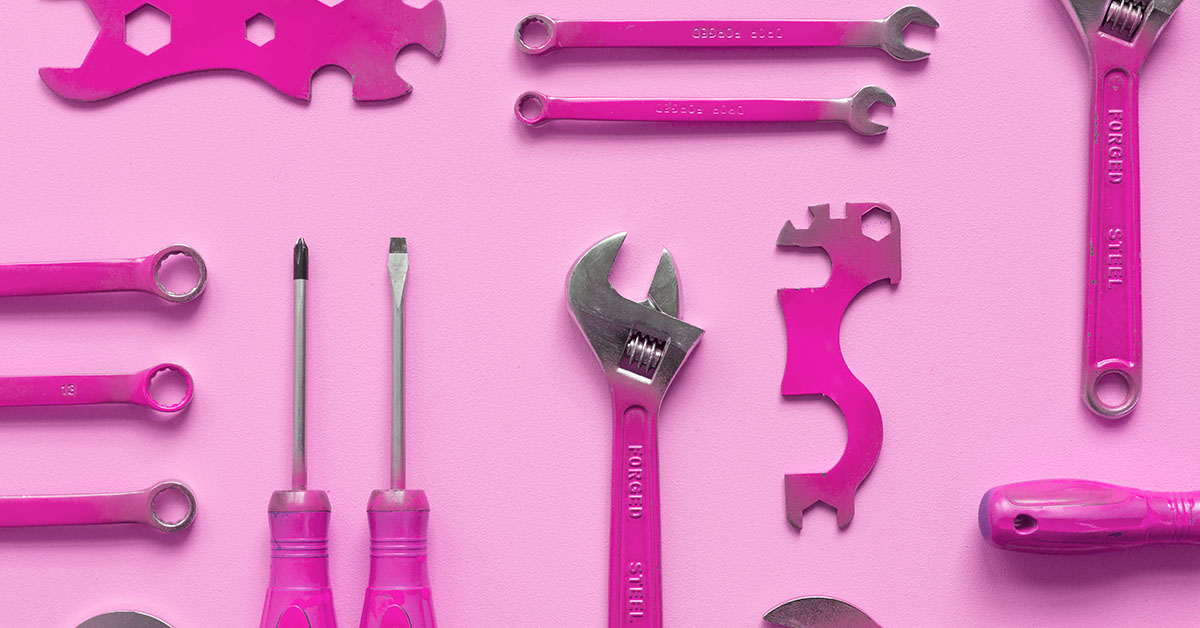Do women really crave ladypens and pink power tools?
“It is a truth universally acknowledged, that a single man in possession of a good fortune will have a more capacious ear canal than that of the woman he chooses as his wife.” Truth to tell, Jane Austen didn’t write those words—but she well might have had she penned her novels at night and worked days as a copywriter for Mack’s Dreamgirl Soft Foam Earplugs.
An ad for this oddly-named product landed in our in-box recently. The earplugs, designed “for small or sensitive ear canals,” are pink in color and “softer and smaller” than their unisex counterparts, muffling the sound of “snoring, power tools, shooting sports, loud events” and other aural assaults. Nothing on the package—except for “Dreamgirl”—explicitly references gender, yet the message is clear: These are ladyplugs.
Therein hangs a question: Why? Or, not to put too fine a point on it, Why?! What conceivable purpose is served by earmarking a separate line of earplugs—or pens, razors, guns, toothpaste, beer, cars and, yes, power tools—exclusively for one gender? More to the point, why would anyone purchase such a product—and pay a premium, commonly known as the “pink tax”—for the privilege?
As a woman-founded-and-owned agency, by no means do we take issue with the value of gender-attuned marketing. Women make up more than half of the U.S. population and control 85% of consumer spending according to Forbes; globally, their annual purchasing power averages some $31.8 trillion. “By 2030,” Kiplinger predicts, “American women will control much of the $30 trillion in financial assets that belong to Baby Boomers, a level of wealth that is close to the current annual GDP of the entire United States.”
Like any demographic—men, LBGTQ+, millennials, boomers, rural families, urbanites—women process messaging in characteristic ways as reflected in their buying attitudes and behaviors. As we see it, there is no question that reaching women with relatable messaging makes eminently good sense. Indeed, there can be legitimate reasons to target women—or any given demographic—to the exclusion of others. Surely no one is pitching jitterbug phones and walk-in tubs to millennials, or hay balers to city apartment dwellers. And, obviously, there are product categories and subcategories unarguably suited just to women.
Nor do we take issue with pink as, well, a color. There is nothing inherently feminine about pink; it’s the color of choice for lots of people, irrespective of gender. In fact, it wasn’t until the early 1900s that advertisers concocted the notion of sex-specific colors—only the rule was pink for boys, blue for girls. The formula wasn’t reversed until the 1940s. In recent years, pink has come to denote a range of activist causes in support of social justice, women’s rights and racial equality.
It is only when marketers default to pink as a facile way to connect with women that we see red. Sadly, it happens a lot—and always has. A tsunami of ridicule hasn’t stopped Bic from hyping a line of pink “for Her” pens. The Dodge La Femme, which rolled daintily off the assembly lines in 1955, was upholstered in rosebud cloth and available in “Heather Rose” and “Misty Orchid.” The Jenga stacking game’s Girl Talk version adds “questions you’ll love” and solid wood blocks that are “pretty in pink.”
To be sure, not all arbitrarily gendered products are targeted at women. Consider Kleenex tissue “for men,” Signal “Now Men” toothpaste or Bounce “Pure Sport” Fabric Softener for Men. “I tried it and thought I would smell like I made 23 cents more an hour, as promised, but nope,” wrote one woman in a review on Amazon.
There are companies that market female-friendly firearms and those, like U-GoGirl Work Tools, that specialize in screwdrivers, pliers, nut drivers and other workbench necessities for women. But nothing tops an ingenious device that combines both in a single package—a rechargeable power screwdriver in the shape of a pink snub-nosed resolver available on Amazon. For added realism, the six drill bits are stored bullet-like in the chamber. “Do-it-yourselfers can tackle that list of fix-it chores AND pack some heat!” says the ad copy.
Of course, power tools can be noisy and a particular affront to delicate feminine sensibilities. Maybe keep a supply of Dreamgirl earplugs on hand.




